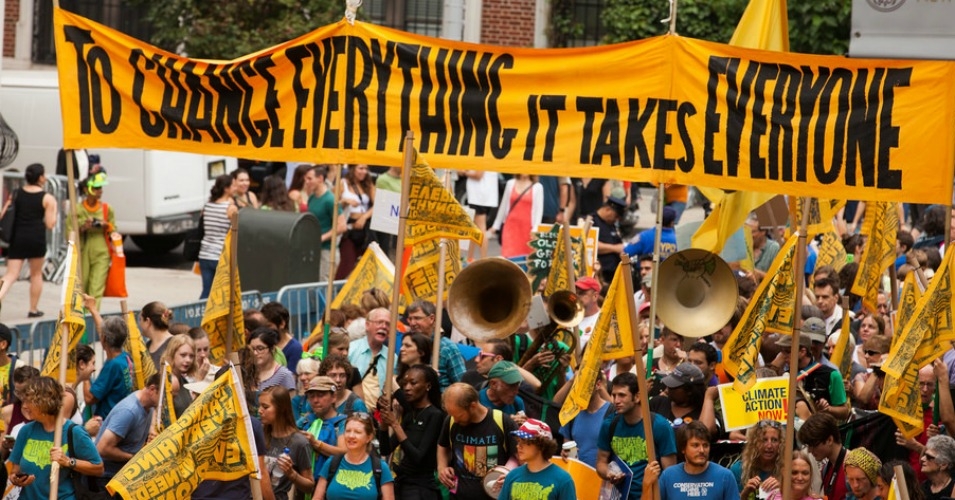The climate movement could learn some lessons from the fight against Big Tobacco.
by Anna Lappé
At 1:00 p.m. on Sunday, September 21, the 400,000 people gathered for the People’s Climate March in New York City took a moment of silence for those whose lives have already been lost because of climate change. The silence swept up Central Park West from Columbus Circle to 85th Street. A quiet fell among the Indigenous activists and solar power advocates, the high school students and octogenarians, all packed shoulder-to-shoulder. Ten seconds, 20 seconds, nearly a minute passed. Then, in the distance, a sound, quiet at first, but growing second-by-second until it surrounded us: shouts, hollers, and whoops sounding the alarm about our overheating planet. People around me cheered and hugged, tears streaming down faces. It was heartbreaking; it was exhilarating. We were not alone. We were legion.
The People’s Climate March in New York City in September was the largest expression of popular concern about the climate crisis the world has ever seen. But a march alone doesn’t make history.
Organizers called the New York City march the largest climate demonstration ever. Add to that the 2,646 satellite demonstrations from Berlin to Burundi, and the day’s actions were certainly the largest expression of popular concern about the crisis the world has ever seen.
Of course, a march alone doesn’t make history. To do that will require directly confronting the powerful fossil fuel interests that are central culprits in the crisis. Such a confrontation will, among other things, mean kicking the carbon polluters out of the climate negotiating rooms. A huge task, for sure. But we can take courage, and learn lessons, from the brave public-health activists who took on Big Tobacco.
For much of the twentieth century, Big Tobacco had done what Big Oil and King Coal are doing now: stalling regulation of a product that was killing millions a year. By the 1980s, the outcry against Big Tobacco had resulted in movement at the global level as The World Health Assembly began to develop the Framework Convention on Tobacco Control.
Civil society organizations such as Corporate Accountability International (for which I am an adviser) understood that in order to ensure the treaty had teeth, Big Tobacco couldn’t be involved in its framing. But there were divided camps. Some felt it would be impossible to kick Big Tobacco out of the negotiations. Others held steady – and they won. The result was 30 words that changed the tobacco fight for good. Article 5.3 in the Framework Convention states: “In setting and implementing their public health policies with respect to tobacco control, parties shall act to protect these polices from commercial and other vested interests of the tobacco industry.”
Compare Article 5.3 to what’s permissible in climate negotiations. At the annual climate meetings – called “Conference of Parties,” or COPs – Big Energy organizes pavilions, din- ners, and breakaway meetings. Some industry representatives have even attended COPs as official members of country delegations. Corporations have been granted official observer status and given key roles through industry trade associations. At last year’s COP in Poland, the World Coal Association partnered with the Polish Ministry of Economy to promote coal as a solution to climate change. At the 2011 COP in South Africa, the Carbon Capture and Storage Association, made up of fossil fuel and power companies, lobbied for and won carbon credits for new coal plants, even though carbon offsets for coal are known to be counterproductive.
Hundreds of organizations from around the world are pressuring the United Nation to heed the lesson from tobacco advocates and end the cozy relationship between Big Energy and climate negotiators. As advocates wrote in a November 2013 letter to UN Secretary-General Ban Ki-moon: “We urge you to look at such examples and take commensurate action to protect climate policy-making from the vested interests of the fossil fuel industry – or companies whose core business model depends on the excessive emission of greenhouse gases – and their attempts to undermine and subvert urgently needed action.”
After the raucous moment of celebration at the People’s Climate March, the Corporate Accountability International contingent nearby cheered: “1, 2, Article 5.3: Let’s kick out big energy!” I know, it’s not exactly the catchiest chant, but it does zero in on a key to helping us turn that energizing day in the streets into the real stuff of history making.
Originally published in Earth Island Journal
Photo by South Bend Voice/Flickr



